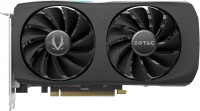Graphics Cards ZOTAC series Triple/Twin (gaming)
prices on 17 modelsZOTAC Triple/Twin Series
After the announcement of the new generation NVIDIA RTX 30XX, the graphics card market has changed irrevocably. And how else, when the simplest novelty in the face of GeForce 3060 bypasses the "yesterday's" leader GeForce 2080 in terms of pure performance? Realizing that most gamers will be sitting on these video cards in the coming years, major manufacturers decided to revise and update their product lines. Zotac turned out to be the most understandable of all: the most powerful and hottest caliber models (RTX 3080/3090) received massive triple coolers and moved to the ZOTAC Trinity team, and simpler models (RTX 3060/3070), which have enough two-section turntables, now come out under the Twin flags.
 |
Despite this separation, it is clear that both series, as they say, grew up in the same sandbox and shared toys since childhood. They share an ascetic approach to design and savings on small things that do not affect the performance of the graphics card or memory in any way. The casings of most Dual video accelerators are made of practical, but unremarkable plastic, there is no backlight in any form, there are no decorative elements either. To paraphrase a bearded joke, do you need checkers or do you want to play?
But for cooling, almost the same Cooling system is used as in the ZOTAC Trinity models: a massive aluminium radiator penetrates half a dozen heat pipes, a metal backplate is responsible for the structural strength and cooling of memory chips, and several IceStorm turntables with a symmetrical impeller cool the structure from above. In addition to affordable prices and efficient cooling, the advantages of the Twin series include a short length.
For example, the length of the very, very powerful GeForce RTX 3070 Twin Edge is only 232 mm, which makes it an perfect candidate for installation in a small-sized case. With factory overclocking, the situation is as follows: out of the box, chips and cores are overclocked by only a few percent (compared to references) and Zotac leaves all experiments with overclocking to the will of the user. Fortunately, the quality of cooling, additional power outlets and the built-in IceStorm utility simplify this process to the level of "peeled potatoes, fried potatoes".








